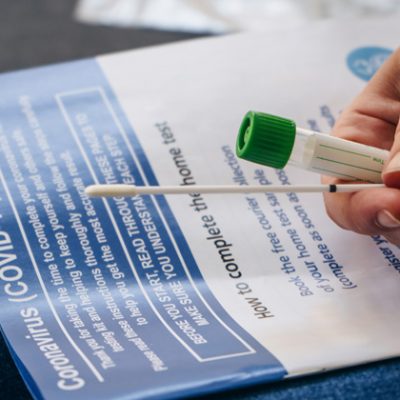The government has told schools that staff and pupils should continue to undergo Covid testing throughout the Easter holidays.
In an email sent to school leaders today, and seen by Schools Week, the Department for Education (DfE) warned it is “vital to keep testing at home throughout the Easter holidays and into the summer term”.
The guidance states that all staff, pupils and parents who are able to should conduct twice-weekly rapid result tests at home each week from now on.
They should report the results from their lateral flow device (LFD) test online and “continue to test twice weekly over the Easter holidays”.
In addition staff, pupils and parents at secondary schools and colleges must take a Covid test before returning for the summer term.
The test must be conducted “either the night before, or morning of, the first day back” in order to identify and isolate any potential cases.
Elsewhere, the email states that secondary schools and further education colleges will receive more Covid test kits this week “which should include enough kits to last over the Easter holiday”.
 Asymptomatic testing programme
Asymptomatic testing programme
Schools reopened to all pupils on March 8. As part of the return, asymptomatic testing was rolled out at secondary schools and colleges.
All secondary age pupils and above were expected to conduct three on-site tests within the first fortnight, before switching to twice weekly home-testing after that.
All secondary pupils taking part in the voluntary testing programme should now be home testing.
Primary school pupils did not take part in the asymptomatic testing programme, but both primary and secondary staff have been conducting twice-weekly home tests since the full return.
Those who receive a positive result, along with any close contacts, must self-isolate for 10 days.
However, the programme has come under criticism due to the “illogical” and differing policies for when confirmatory lab tests are required following positive rapid results.
The DfE states that pupils told to self-isolate after a positive rapid test carried out in school should not get this confirmed by the more accurate polymerase chain reaction (PCR) test.
Even if a subsequent PCR test returns a negative result, the first result would not be overridden. It has led to pupils with potential false positives – and all of their close contacts – kept off school.
Yet for rapid tests taken at home, pupils are told to get a confirmatory PCR test which can override the rapid result.
Household testing
Since March 1, households with school age children have been eligible to receive two rapid result Covid tests per person each week.
The DfE previously made clear that schools must not provide these tests to the families. Instead, households can access tests via their employers, by attending a local test site, by collecting testing kits from a local site or by ordering them online.
The scheme, which is led by the Department of Health and Social Care, is not mandatory but is encouraged.
 Attendance impacted by testing
Attendance impacted by testing
School attendance data released by the DfE today found the number of secondary school pupils self-isolating due to potential contact with a Covid case increased by 461 per cent.
Last Thursday, 58,400 secondary pupils were self-isolating for this reason, compared with 10,400 the week before.
Overall, 201,000 pupils across England’s state schools were off because of Covid on March 18, up from 78,000 the previous week.
The DfE said that the pupil absence rate due to confirmed cases and self-isolation “may be impacted by levels of testing”.
It added: “This should be taken into consideration when comparing absences between different types of schools.”








Your thoughts